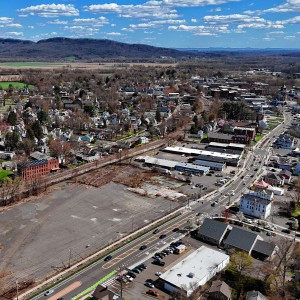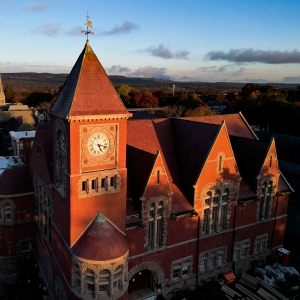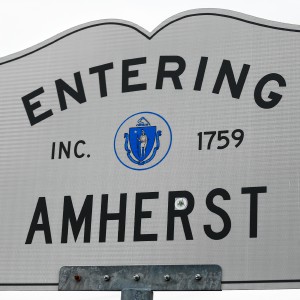Northampton’s Pie in the Sky Berry Farm offers pick-your-own organic flowers
| Published: 08-18-2023 9:48 PM |
NORTHAMPTON — Beyond the fairgrounds, past an I-91 overpass and the airport, and around a tight corner shrouded by trees is a path that opens up to a vista of the Mount Holyoke Range and Summit House.
The picturesque landscape is elevated only by the scenic viewpoint itself where there is currently a show being performed daily that includes routines from the Wizard of Oz.
However, this Emerald City doesn’t feature Dorothy or a tin woodsman. In fact, this Wizard of Oz is actually a pale pink honeycombed flower; one of several varieties of dahlias that have blossomed on an 8.5-acre property in the Northampton meadows called the Pie in the Sky Berry Farm.
“It’s a really special place,” said Kristen Sykes, who co-owns the organic farm.
Sykes and her husband Fred “Farmer Fred” Beddall purchased the land at 139 Fair Street Extension in 2017 with the intention of growing local fruits, such as strawberries and blueberries.
This summer, Sykes and Beddall celebrated their fifth season of growing organic strawberries with approximately 1,500 customers over the three-week season. Though the blueberry bushes took a little longer to mature, they were able to offer a limited picking season in 2020 and have grown to be more fruitful each year.
This past year, the couple added you-pick flowers to the mix, planting an assortment of marigolds, zinnias, gomphrena and more. Although the berry season has lapsed, the farm has recently reopened to offer pick-your-own flowers every weekday afternoon, from 5 to 7 p.m.
Patrons can cut up to 15 stems of flowers, except for dahlias, for $15. Mixed bouquets with up to six dahlias and nine other flowers cost $20.
Article continues after...
Yesterday's Most Read Articles
 More than 130 arrested at pro-Palestinian protest at UMass
More than 130 arrested at pro-Palestinian protest at UMass
 Public gets a look at progress on Northampton Resilience Hub
Public gets a look at progress on Northampton Resilience Hub
 Northampton bans auto dealerships near downtown; zone change won’t affect Volvo operation on King Street
Northampton bans auto dealerships near downtown; zone change won’t affect Volvo operation on King Street
 UMass basketball: Bryant forward Daniel Rivera to be Minutemen’s first transfer of the offseason
UMass basketball: Bryant forward Daniel Rivera to be Minutemen’s first transfer of the offseason
 Town manager’s plan shorts Amherst Regional Schools’ budget
Town manager’s plan shorts Amherst Regional Schools’ budget
 Police respond to alcohol-fueled incidents in Amherst
Police respond to alcohol-fueled incidents in Amherst
Though it’s hard to pick just one favorite, Sykes has grown especially smitten with the dahlias. Admittedly, she says she’s gone down the rabbit hole a bit with her love for the tuberous plant. Since first admiring the blooms, she’s done extensive research on the history of dahlias, attended dahlia shows where the plant is judged, joined the New England Dahlia Society and even begun reading about how to hybridize them. She even sports a pair of handmade dahlia earrings she bought from an artist on the online marketplace Etsy.
“From what I learned from my research, there can be upwards of 57,000 varieties of dahlias and the neat thing is their composition is such that there are folks who are able to hybridize them … and when you actually develop a new variety successfully of dahlia, you can even name it,” she said. “And the names are so fun.’
In addition to the Wizard of Oz, Sykes said that other varieties of dahlias with unique names offered by the farm include ketchup and mustard, Steve-O, Who Me? and Pooh, as in the fictional illustrated teddy bear created by author A.A. Milne and illustrator E. H. Shepard, Winnie the Pooh.
Though Sykes describes the blossoms as nothing short of spectacular, one aspect of the farming that is a little challenging is that the dahlias have to be dug up every fall because of New England’s cool climate. Once the first so-called “killing frost” sets in and the dahlias that looked as though they were ready to bloom are frozen in time by the weather, Sykes and Beddall will have to dig up the tubers and store them for the winter. The bright spot is that once the dahlias are dug up at the end of the season, one plant can yield between three and 10 tubers.
“You’re tripling or multiplying every time you plant a dahlia,” she said.
In order to get to the pick-your-own flower garden, patrons must pass through a passageway created out of buckwheat. The buckwheat was planted as a cover crop, according to Beddall. A cover crop is a plant that’s used to improve the soil health, enhance water availability, suppress the growth of weeds, and slow erosion. The white blossoms on the tall crop also attract insects and pollinators like honeybees and bumblebees.
“A lot of what we do with flowers in particular is we’re trying to attract pollinators,” said Beddall, noting that they had planted a number of native plants. “We’re doing a lot to be good stewards of the land. We’re trying to create a beautiful space that is also really good for wildlife.”
On most sunny days, patrons can walk into a sanctuary of butterflies and dragonflies, and also spot several different kinds of birds, including Baltimore orioles and merlins.
In addition to employing chemical-free practices, the Pie in the Sky Berry Farm is using ecologically friendly techniques like “low till” agriculture. This method combines several techniques, including installing aged manure, in an effort to improve the fertility of the soil without frequent tilling.
Though Beddall does occasionally use a tractor, Sykes said her husband employs the use of a scythe to cut the grass.
“We try to be as environmentally conscious as we can,” she said. “We hope that people will have a good time connecting in nature and enjoy the view in such a stunning space.”
Pie in the Sky Berry Farm accepts cash or Venmo only. For more information about the farm, call 413-650-0356.

 State Senate budget funds free community college for all
State Senate budget funds free community college for all ‘We can just be who we are’: Thousands show support for LGBTQ community at Hampshire Pride
‘We can just be who we are’: Thousands show support for LGBTQ community at Hampshire Pride Doors open at Tilton Library’s temporary home at South Deerfield Congregational Church
Doors open at Tilton Library’s temporary home at South Deerfield Congregational Church Area property deed transfers, May 2
Area property deed transfers, May 2
